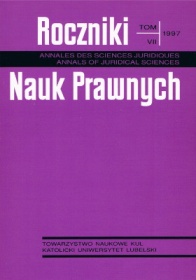Essential Marital Duties in the Code of Canon Law of 1983
Abstract
The Code of Canon Law (KPK) o f 1983 laid greater stress on marital duties than the KPK of 1917. In the current code the church lawgiver has defined for the first time the meaning of essential marital duties. This is formulated in the following canons: 1095, 1096 and 1 101 o f KPK. In John Paul IPs code, sections two and three of canon 1095 refer specifically to the essential marital duties. The church lawgiver made the validity of marriages dependent on a due understanding of these duties and an ability to fulfill them.
The lawgiver, however, has defined neither the essential mar ital duties nor reasons of a psychological nature which make it impossible for a married person to perform marital duties or to exercise discernment in this sphere. It is worth noting that during the work on the KPK of 1983 it was only at the final editorial corrections, inspired by John Paul II, that the terminology of sections two and three of canon 1095 was standardized: the word ’essential' (of duties) was added to both sections.
The awareness o f the frequency and means of deciding marital invalidity through reference to sections 2 and 3 of canon 1095 in the 1983 code has made us examine where the reason for the different ways in which this canon has been used by individual church tribunals lies. It seems that to a great extent this results from the lack of a catalogue of essential marital duties.
The paper justifies the need for a detailed definition o f essential marital duties, and points to the source and scope of those duties. It concludes by defining particular essential mar ital duties as well their legal significance.
Recently, the number of lawsuits for the statement o f marital invalidity has increased both in Poland and in the world. Especially, the number of lawsuits in church courts is on the increase, lawsuits due to the inability to take up and fulfill essential marital duties (can. 1095 no 3). Together with the lawsuits concerning lack of discernment (can. 1095 no 2) these cases make in Poland more than half of all the lawsuits. It is worth noting that in the verdicts of the Roman Rota of recent years, based on the can. 1095, there is no such tendency, as has been observed in many diocesan tribunals in different countries o f the world.
Essential marital duties result from the three traditional marital goods and from boum coniugum (can. 1055 par. 1). Essential duties, referring generally to a unifying and procreative aspect o f marriage, cor respond to the twofold direction of marriage: to bonum coniugum and bonum prolis . Marital duties may somewhat differ, as regards time and place, and may be temporally and culturally conditioned.
On the basis of the analyses carried out in rotal verdicts as well as on the basis o f the arguments o f a few canonists on this question, we may state that it is possible to distinguish some ten to twelve essential marital duties. They have an enormous theoretical and practical significance. Without their fulfillment marital and familial life would be impossible. Accordingly, the church lawgiver should exercise more care as regards canons 1063, 1095, 1096, and 1101 of the new code than would previously have been the case.
Copyright (c) 1997 Roczniki Nauk Prawnych

This work is licensed under a Creative Commons Attribution-NonCommercial-NoDerivatives 4.0 International License.


